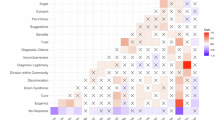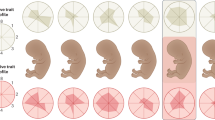Abstract
Developments in genomics research have been accompanied by a controversial ethical injunction: that researchers disclose individually relevant research results to research participants. With the explosion of genomic research on complex psychiatric conditions such as autism, researchers must increasingly contend with whether – and which results – to report. We conducted a qualitative study with researchers and participants involved in autism genomics research, including 4 focus groups and 23 interviews with parents of autistic children, and 23 interviews with researchers. Respondents considered genomic research results ‘reportable’ when results were perceived to explain cause, and answer the question ‘why;’ that is, respondents set a standard for reporting individually relevant genetic research results to individual participants that is specific to autism, reflecting the metaphysical value that genetic information is seen to offer in this context. In addition to this standard of meaning, respondents required that results be deemed ‘true.’ Here, respondents referenced standards of validity that were context nonspecific. Yet in practice, what qualified as ‘true’ depended on evidentiary standards within specific research disciplines as well as fundamental, and contested, theories about how autism is ‘genetic.’ For research ethics, these finding suggest that uniform and context-free obligations regarding result disclosure cannot readily be specified. For researchers, they suggest that result disclosure to individuals should be justified not only by perceived meaning but also by clarity regarding appropriate evidentiary standards, and attention to the status of epistemological debates regarding the nature and cause of disorders.
Similar content being viewed by others
Log in or create a free account to read this content
Gain free access to this article, as well as selected content from this journal and more on nature.com
or
References
Kumar R, Christian S : Genetics of autism spectrum disorders. Curr Neurol Neurosci Rep 2009; 9: 188–197.
Cowan W, Kopinsky K, Hyman S : The human genome project and its impact on psychiatry. Annu Rev Neurosci 2002; 25: 1–50.
Psychiatric GWAS Consortium Coordinating Committee, Cichon S, Craddock N et al: Genomewide association studies: history, rationale, and prospects for psychiatric disorders. Am J Psychiatry 2009; 166: 540–556.
Geschwind D : Autism: Many Genes, Common Pathways? Cell 2008; 135: 391–395.
Miller F, Begbie M, Giacomini M, Ahern C, Harvey E : Re-defining disease? The nosologic implications of molecular genetic knowledge. Perspect Biol Med 2006; 49: 99–114.
Tabor H, Cho M : Ethical implications of array comparative genomic hybridization in complex phenotypes: points to consider in research. Genet Med 2007; 9: 626–631.
Ali-Khan S, Daar A, Shuman C, Ray P, Scherer S : Whole genome scanning: resolving clinical diagnosis and management amidst complex data. Pediatr Res 2009; 66: 357–363.
Fernandez C, Kodish E, Weijer C : Informing study participants of research results: an ethical imperative. IRB 2003; 25: 12–19.
Knoppers B, Joly Y, Simard J, Durocher F : The emergence of an ethical duty to disclose genetic research results: international perspectives. Eur J Hum Genet 2006; 14: 1170–1178.
Caulfield T, McGuire A, Cho M et al: Research ethics recommendations for whole-genome research: consensus statement. PLoS Biol 2008; 6: 430–435.
Ravitsky V, Wilfond B : Disclosing individual genetic results to research participants. Am J Bioeth 2006; 6: 8–17.
Shalowitz D, Miller F : Disclosing individual results of clinical research: implications of respect for participants. JAMA 2005; 294: 737–740.
Murphy J, Scott J, Kaufman D, Geller G, LeRoy L, Hudson K : Public expectations for return of results from large-cohort genetic research. Am J Bioeth 2008; 8: 36–43.
Forsberg J, Hansson M, Eriksson S : Changing perspectives in biobank research: from individual rights to concerns about public health regarding the return of results. Eur J Hum Genet 2009; 17: 1544–1549.
Miller F, Christensen R, Giacomini M, Robert J : Duty to disclose what? Querying the putative obligation to return research results to participants. J Med Ethics 2008; 34: 210–213.
Parker L : Best laid plans for offering results go awry. Am J Bioeth 2006; 6: 22–23.
Shalowitz D, Miller F : The search for clarity in communicating research results to study participants. J Med Ethics 2008; 34: e17.
Richardson L : Writing: a method of inquiry; in Denzin N, Lincoln Y (eds): Handbook of Qualitative Research. Thousand Oaks, CA: Sage, 2000, pp 923–949.
Charmaz K : Grounded theory: Objectivist and constructivist methods; in Denzin N, Lincoln Y (eds): Handbook of qualitative research. Thousand Oaks: Sage, 2000, pp 509–535.
Addison R : A grounded hermeneutic editing approach; in Crabtree B, Miller W (eds): Doing Qualitative Research. Thousand Oaks: Sage, 1999, pp 145–161.
Miller F, Giacomini M, Ahern C, Robert J, de Laat S : When research seems like clinical care: a qualitative study of the communication of individual cancer genetic research results. BMC Med Ethics 2008; 9: 4.
Feuk L, Carson A, Scherer S : Structural variation in the human genome. Nat Rev Genet 2006; 7: 85–97.
Buchanan J, Scherer S : Contemplating effects of genomic structural variation. Genet Med 2008; 10: 639–647.
Goobie S, Knijnenburg J, Fitzpatrick D et al: Molecular and clinical characterization of de novo and familial cases with microduplication 3q29: guidelines for copy number variation case reporting. Cytogenet Genome Res 2008; 123: 65–78.
Miller F, Ahern C, Ogilvie J, Giacomini M, Schwartz L : Ruling in and ruling out: the implications of molecular genetic diagnoses for disease classification. Soc Sci Med 2005; 61: 2536–2545.
Acknowledgements
We are indebted to the many busy people who agreed to speak with us about their lives and work, and we also thank the Ontario Genomics Institute for funding for the project. Fiona A Miller is supported by a New Investigator Award from the Canadian Institutes of Health Research (80495). Robin Z Hayeems is supported by a CADRE Postdoctoral Fellowship from the Canadian Institutes of Health Research and the Canadian Health Services Research Foundation. Sponsors’ support for this work should not imply endorsement of the conclusions, for which the authors retain sole responsibility.
Author information
Authors and Affiliations
Corresponding author
Ethics declarations
Competing interests
The authors declare no conflict of interest.
Additional information
Supplementary Information accompanies the paper on European Journal of Human Genetics website
Supplementary information
Rights and permissions
About this article
Cite this article
Miller, F., Hayeems, R. & Bytautas, J. What is a meaningful result? Disclosing the results of genomic research in autism to research participants. Eur J Hum Genet 18, 867–871 (2010). https://doi.org/10.1038/ejhg.2010.34
Received:
Revised:
Accepted:
Published:
Issue date:
DOI: https://doi.org/10.1038/ejhg.2010.34
Keywords
This article is cited by
-
Comprehensive Genetic Analysis of Non-syndromic Autism Spectrum Disorder in Clinical Settings
Journal of Autism and Developmental Disorders (2021)
-
Autism genetics: opportunities and challenges for clinical translation
Nature Reviews Genetics (2017)
-
“Set in Stone” or “Ray of Hope”: Parents’ Beliefs About Cause and Prognosis After Genomic Testing of Children Diagnosed with ASD
Journal of Autism and Developmental Disorders (2017)
-
Parents’ Perceptions of the Usefulness of Chromosomal Microarray Analysis for Children with Autism Spectrum Disorders
Journal of Autism and Developmental Disorders (2015)
-
Genetic testing and genetic counseling among medicaid-enrolled children with autism spectrum disorder in 2001 and 2007
Human Genetics (2014)



